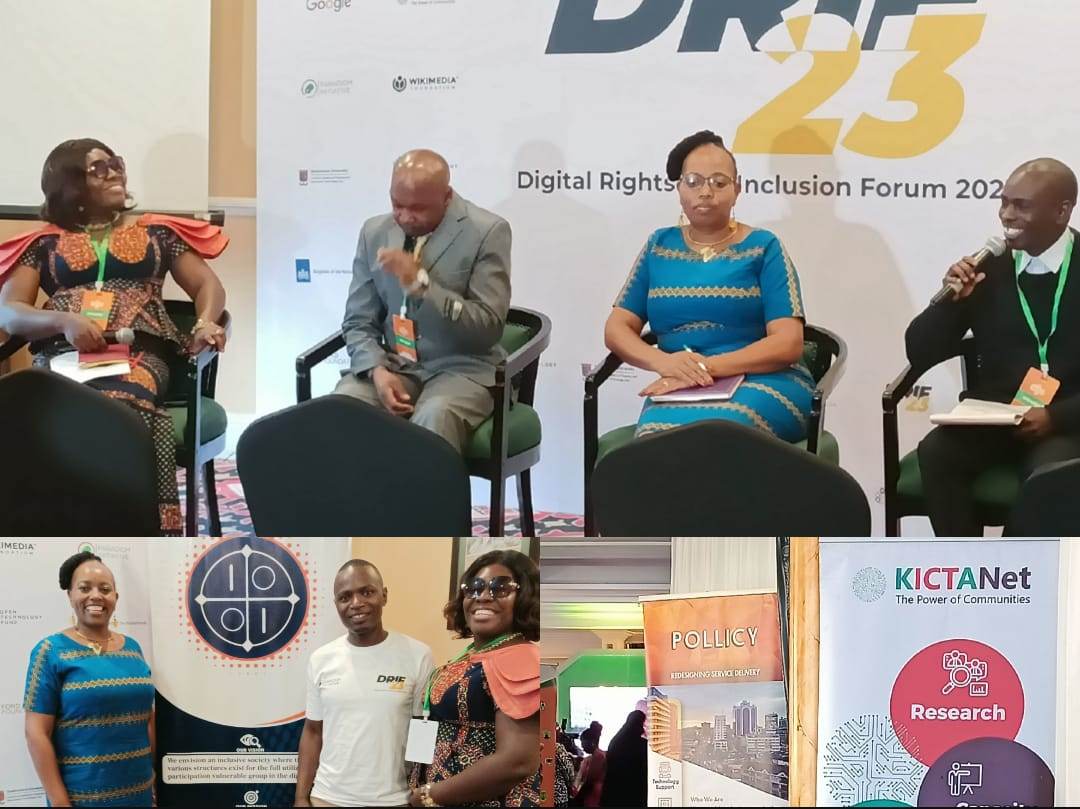“Building a Sustainable Internet for All” was the theme for the Digital Rights and Inclusion Forum(DRIF),2023. Digital Inclusion was the major subtheme in the discussions.
The subtheme stirred the digital rights discussion with an in-depth look into digital inclusion for the vulnerable and marginalized, and the promotion of internet inclusion.
In one of the panels moderated by Millicent Agangiba the executive director of the Inclusive Tech Group from Ghana, Salome Nduta the executive director of Women Human Right Defenders, Dennis Orengo a human defender, and Derick Shimoli a diversity and inclusion Officer from Kenya Union of the Blind, I gathered the following key points;
To promote internet Inclusivity;
- The key player on the internet should speak out to ensure inclusivity is part of every process and is bonded to every sustainable plan.
- Inclusion should be guided by policy and legal frameworks that inform access to the internet, an example being the Protocol to the African Charter on Human and People’s Rights which is signed by many countries but lacks domestication, as was the case with Article 35 of the Kenyan Constitution 2010.
- The inclusion processes should have guidelines, and be presented to service providers, and regulators to ensure access to information is availed to all.
For the inclusion of women in the digital space;
- We should focus on internet access and its availability
- This is informed by the fact that the internet can be available but not accessible.
- We should ensure legal frameworks, structures and systems that promote and ensure the needs of women are included, and guided by the allocation of resources
It is worth noting that without digital inclusion, we will not be able to tell our stories.
- The vulnerable and minorities will not be heard, they will not have the opportunity to tell their stories.
- Our interest will be shifted from addressing our needs to meeting the needs of those in the boardrooms.
- As such, we must realise that information is power and we possess that power as stakeholders to make informed decisions that affect us.
What are the hindrances to achieving digital Inclusion?
- Poverty comes on top of the list, followed by access to devices, and connectivity
- The quality of the devices we use to access the internet creates inequality
- Lack of sustainability of Internet access and connection programs
- The quest for value for money leads to neglecting and avoiding regions deemed to have low purchasing powers.
- Low digital literacy levels among marginalized and vulnerable communities and regions
- Inadequate awareness of the opportunities available on the internet, and the need for models that improve family welfare, since the majority of people would prefer initiatives that will promote their livelihoods.
- The concentration of infrastructure rollouts like electricity and internet optical fibre rollouts in urban and high-end regions of the society
Other factors limiting digital inclusion are data misrepresentation and disparity in data segregation, more specifically among people with disabilities.
- Policies that inform data collection and resource allocation are not adequately planned, and these would likely become agents of inequality.
- The end users’ attitudes form a barrier to the existing inclusion and sustainability programs
- Everyone should be capable of speaking about themselves on issues that affect them directly.
- We should slow down and avoid rushing through policy formulation processes and enacting regulations without proper consultation. Let the vulnerable participate in these processes, and own the processes
The KICTANet Digital Accessibility for Persons with Disabilities team works directly with Persons with Disabilities in Kenya towards influencing their access to ICTs as well as their lived experiences and their input towards ICT policy in Kenya.
![]()




